Authors
David J. Keegan

David J. Keegan is adjunct lecturer in the Chinese Studies Program at Johns Hopkins School of Advanced International Studies, where he teaches a seminar on Taiwan and its relations with the United States and mainland China. He has also taught area studies courses on China, Northeast Asia, and the Pacific at the State Department Foreign Service Institute. holds a Ph.D. in Chinese History from the University of California, Berkeley. Dr. Keegan served as a Foreign Service Officer in the U.S. State Department for thirty years, specializing in China, Taiwan, and the Asia Pacific region. Among his assignments, he served as Deputy Director of the American Institute in Taiwan and Deputy Chief of Mission and Chargé at the U.S. Embassy in New Zealand. Dr. Keegan also served as: Director of the Office of Taiwan Policy in the Bureau of East Asian and Pacific Affairs.
Articles by David J. Keegan
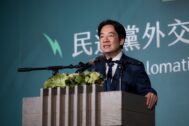
China - Taiwan
September — December 2023Taiwan Voters Choose Independence
Taiwan’s election campaign has concluded. Voters went to the polls on Jan. 13. As has been the case in almost every election, cross-Strait relations with China were the central issue, a secondary issue being President Tsai Ing-wen’s management of the economy. The outcome of the election will largely dictate the course of Taiwan-China relations over at least the next four years. The Democratic Progressive Party (DPP) candidate and President Tsai Ing-wen’s chosen successor, William Lai Ching-te, the eventual winner, proclaims that Taiwan is already independent as the Republic of China. It should continue to diversify economic linkages away from China, strengthen military deterrence, and hope that China will eventually offer talks without one-China preconditions. The opposition Kuomintang candidate, Hou Yu-ih, called for expanded cross-Strait economic ties and dialogue with China under the one-China banner to reduce tensions while Taiwan also builds its military deterrence. China has deployed economic sticks, gray-zone military intimidation, and fake news to influence the election.
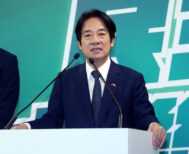
China - Taiwan
May — August 2023Stark Choices Confront Taiwan Voters
Taiwan’s presidential election campaign has begun. Lai Ching-te, Taiwan’s vice president and Democratic Progressive Party (DPP) candidate, Hou Yu-ih from the Nationalist (Kuomintang, or KMT) Party, Ko Wen-je of Taiwan People’s Party (TPP), and independent Terry Gou offer Taiwan voters four different visions of Taiwan’s future relationship with China. As senior US and Chinese officials resumed long-stalled face-to-face meetings, China warned once again that it has no room for compromise or concession on Taiwan. Yet, when Lai completed almost invisible transits through the US en route to Paraguay and back, China’s military response seemed almost pro-forma. When US, Japanese, and South Korean leaders reiterated at the trilateral Camp David summit their staunch opposition to China’s intimidation, China chose to interpret their words as one more promise to support Taiwan. The US accelerated weapons deliveries to Taiwan and expanded training for Taiwan’s military, and Taiwan announced that its defense budget will increase by 7.5% in 2024. Taiwan’s TSMC moved forward on constructing its Arizona factory despite some hiccups, and the US and Taiwan signed a long-awaited trade deal—the first part of their 21st Century Trade Initiative.

China - Taiwan
January — April 2023Confrontation Muted, Tensions Growing
As 2023 began, cross-Strait confrontation was muted. Travel began returning to pre-COVID levels across the Strait and between the mainland and Taiwan’s offshore islands. At China’s annual National People’s Congress, outgoing Premier Li Keqiang and reanointed President Xi Jinping eschewed inflammatory rhetoric about reunification with Taiwan. Taiwan and the US kept Taiwan President Tsai Ing-wen’s transit of the US low-key. Tsai met House Speaker Kevin McCarthy in California, deflecting the speaker’s expressed interest in visiting Taiwan and avoiding the destabilizing Chinese military exercises around Taiwan that followed Speaker Pelosi’s visit last August. Despite this calm, seeds of confrontation proliferated. China cut a communications cable to Taiwan’s offshore islands and announced a coast guard drill to inspect commercial shipping in the Taiwan Strait, both interpreted as practice for gray-zone coercion. China persuaded Honduras to sever its longstanding diplomatic ties with Taiwan. Taiwan increased its military budget and expanded training with US forces. Former Taiwan President Ma Ying-jeou visited China and met Chinese officials, endorsing the 1992 Consensus and signaling that the upcoming election campaign for Taiwan’s president will again offer two very different visions of Taiwan’s future relationship with mainland China.
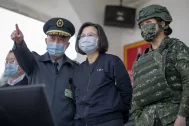
China - Taiwan
September — December 2022Tensions Intensify as Taiwan-US IT Cooperation Blossoms
In the wake of then US Speaker of the House Nancy Pelosi’s visit to Taiwan in August, China’s extensive military exercises continued to impose a more threatening “new normal” in the Taiwan Strait. Taiwan continued to be the focus of heated public exchanges between the US and China. US President Biden said, for a fourth time, that the US would defend Taiwan and added an inflammatory codicil that independence was for Taiwan to decide. At the 20th Congress of the Chinese Communist Party, General Secretary Xi Jinping promised China would strive for peaceful reunification with Taiwan but would not renounce use of force. On Dec. 23, Biden signed the Taiwan Enhanced Resilience Act and a State Department appropriation providing $2 billion in loans for Taiwan to purchase US equipment. Two days later, China sent 71 military aircraft and seven ships to intimidate Taiwan, its largest-ever one-day exercise near the island. Two days later, Taiwan President Tsai Ing-wen announced that Taiwan would extend its military conscription to 12 months. TSMC formally broke ground for the first of two factories in the US, a $40 billion investment.
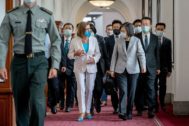
China - Taiwan
May — August 2022Pelosi’s “Ironclad Commitment” or “Political Stunt” Leads to Crisis and Promises Instability in the Taiwan Strait
Between May 1 and Sept. 1, tensions between Taiwan and China exploded in ways few anticipated but were in retrospect the culmination of well-established dynamics. The US once again was right in the middle. On Aug. 2, US Speaker of the House Nancy Pelosi arrived in Taiwan, which Taiwan’s government celebrated as the most important visit in at least 25 years by a US politician. She promised Taiwan President Tsai Ing-wen that US support for Taiwan’s security would remain “ironclad.” On Aug. 4, the day after Pelosi departed Taiwan, China signaled its displeasure by conducting the most extensive military exercises ever conducted near Taiwan, closer to the island than any before, and launching ballistic missiles over Taiwan’s capital to land in waters east of the island. Throughout these exercises, the Chinese, Taiwan, and US militaries avoided any interactions that might have provoked confrontation. On Aug. 10, the Chinese military announced that the exercises had concluded, achieving their objectives, but that the military would continue its activities around Taiwan.
This crisis occurred three months after US Secretary of State Antony Blinken delivered a long-awaited speech on US China policy, claiming that policy toward Taiwan and China, and the US commitment to peaceful resolution of any disputes between them, remained unchanged. China rejected Blinken’s claims of US consistency and insisted that Washinging was hollowing out its commitment to respect Beijing’s position as the only legal government of China, including Taiwan. China expressed particular anger at President Biden’s pledges to defend Taiwan and at the continuing series of high-level US officials visiting Taiwan. Beijing warned it would react harshly if Pelosi visited Taiwan, as she had promised to do. She visited, and China reacted, calling her visit a “political stunt.” China laid out its familiar claims to Taiwan in a celebration of the 30th anniversary of the 1992 consensus and again in its third White Paper on cross-Strait relations. All this comes as Chinese commentators repeat expectations that the 20th Congress of the Chinese Communist Party, scheduled for this fall, will reaffirm the party’s tough Taiwan policy.
Largely obscured by these dramatic developments, Taiwan continued to expand its legitimacy as a constructive international actor, attracting more public support from major international actors beyond the US, such as the G7, the European Union, the United Kingdom, Australia, Japan, and South Korea.

ROUNDTABLE
June 13, 2022Flashpoints in the Indo-Pacific Following the Russian invasion of Ukraine
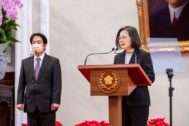
China - Taiwan
January — April 2022Taiwan and China Seek Lessons from Ukraine as Taiwan’s International Position Strengthens
The year 2022 in cross-Strait relations began quite predictably. Both sides repeated their calls for reconciliation, but in completely incompatible terms. Chinese leaders signaled somewhat obscurely that a new tougher Taiwan policy might be announced at the Chinese Communist Party’s Twentieth Party Congress scheduled for this fall, which could further increase cross-Strait tensions. This predictability was upended by Russia’s invasion of Ukraine. China insisted that this international confrontation had no lessons for the purely domestic matter of reunifying Taiwan. Nonetheless, China, Taiwan, and the US have all begun seeking military lessons from the Ukraine War. Taiwan and the US have intensified their discussion as to whether and how aggressively Taiwan should adopt an asymmetric defense relying on the small portable weapons—Javelins, Stingers, and others—that have thus far proven so successful in Ukraine. Diplomatically, the Biden administration has struggled to reassure China that it continues to honor the One-China Policy introduced in the Shanghai Communique 50 years ago even as it signals renewed support for Taiwan’s security. China’s support for Russia has antagonized Europe, Taiwan continues to enjoy success in international diplomacy, and Pacific allies Japan and Australia have become more explicit in their support for cross-Strait stability.
In Taiwan domestic politics, President Tsai Ing-wen is in the strongest position of any Taiwan president midway through a second term after leading her Democratic Progressive Party (DPP) to victories in a local by-election and a local recall effort, both called by the opposition Nationalist Party (Kuomintang or KMT). If the DPP does well in regularly scheduled local elections this fall, that success may set the stage for a confrontation with Xi Jinping as he begins his history-making third term as general secretary of the modern Communist Party.

China - Taiwan
September — December 2021Taiwan Gains Ground Internationally, but Will China Retaliate?
At the end of 2021, Taiwan and President Tsai Ing-wen stand in as strong a position as they have enjoyed in years. Taiwan has parlayed its opening of a representative office in Lithuania and Beijing’s sanctions against Lithuania into public support from other European nations. For the first time Taiwan was invited to a US multilateral event, President Biden’s Democracy Summit. On Dec. 18 Tsai unexpectedly defeated four opposition Kuomintang (KMT)-sponsored referendums that would have reversed a series of her executive actions as president, one of which would have obstructed her efforts to move forward on a bilateral trade agreement with the US. These victories effectively gave the Tsai administration a mid-term vote of confidence and embarrassed newly elected KMT Chairman Eric Chu Lilun. Chinese President Xi Jinping used the anniversary of the 1911 Xinhai revolution to underscore that reunification of Taiwan with the mainland would be the measure of the Communist Party’s success in rejuvenating China. Repeated Chinese air sorties into Taiwan’s Air Defense Identification Zone (ADIZ) made clear China’s willingness to employ coercive tactics short of war to advance its aims. The combination of Taiwan’s successes and China’s determination to subjugate Taiwan may presage a contentious cross-Strait 2022.

China - Taiwan
May — August 2021Cross-Strait Tension Increasing Beneath a Surface Calm
Cross-Strait tensions intensified between May and August 2021, despite the superficial calm that generally prevailed after the dramatic confrontations earlier in the year. China again blocked Taiwan’s participation at the World Health Assembly (WHA), and Xi Jinping reaffirmed the Communist Party’s commitment to the peaceful reunification of Taiwan at the Party’s 100th anniversary. Chinese military flights into Taiwan’s Air Defense Identification Zone were almost routine until China launched 28 sorties in a single day to protest the G7 summit’s endorsement of Taiwan’s participation in the WHA. The Biden administration announced its first arms sales to Taiwan. Several countries, most notably Japan and Australia, made their strongest statements ever in support of Taiwan. Lithuania announced it would permit the opening of an unofficial “Taiwanese” representative office. Beijing withdrew its ambassador from Lithuania and told Lithuania to withdraw its ambassador from Beijing. The US dismissed fears that its withdrawal from Afghanistan might portend abandonment of Taiwan. In coming months, Taiwan faces three potential turning points: Taiwan’s opposition Nationalist Party will elect a new chair; a referendum could overturn the opening of Taiwan’s market to US pork; and the US has signaled it will invite Taiwan to President Biden’s democracy summit despite threats of military retaliation by China.
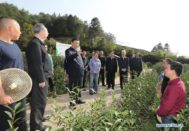
China - Taiwan
January — April 2021Taiwan Prospers, China Ratchets Up Coercion, and US Support Remains “Rock-solid”
For the leadership of Taiwan, the significance for Taiwan’s relationships with the US and China of the end of the Trump administration and the arrival of the Biden administration formed the defining concern as 2021 began. Taiwan welcomed two steps that the Trump administration took in its waning days: announcing a visit to Taiwan by the US ambassador to the UN (even though it was later cancelled) and repudiating the longstanding Taiwan Contact Guidelines, which was widely seen in Taiwan as overly restrictive. Taiwan’s anxieties regarding the Biden administration were quickly allayed, as incoming senior officials repeatedly called US support for Taiwan “rock solid” and issued new far less restrictive Guidelines. Taiwan also benefited from unusually direct expressions of support from Japan and other international partners.
Taiwan’s economy continued to boom despite the pandemic, but its dominance in high-end computer chip production became the subject of worries by US officials and industry groups over supply chain security. China’s military activities near Taiwan included two days of especially intense activity, which were clearly intended to signal its displeasure with the Biden administration’s support for Taiwan. China also banned the import of Taiwanese meat and pineapples and announced preferential treatment for Taiwan investors in mainland agriculture, all clearly targeted at disrupting support for Taiwan’s ruling Democratic Progressive Party and President Tsai Ing-wen among its rural political base. Both strategies appeared more likely to backfire than not. Increasing tensions between the US and China, especially over Taiwan, have led to concerns on all sides that a diplomatic or military confrontation may be growing more likely.